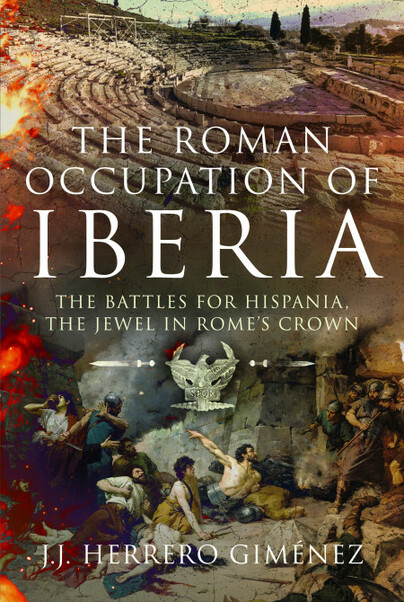The Roman Occupation of Iberia (Hardback)
The Battles for Hispania, the Jewel in Rome’s Crown

Pages: 200
Illustrations: 16 mono illustrations
ISBN: 9781399034692
Published: 4th March 2025
(click here for international delivery rates)
Need a currency converter? Check XE.com for live rates
| Other formats available - Buy the Hardback and get the eBook for £1.99! | Price |
|---|---|
| The Roman Occupation of Iberia ePub (19.0 MB) Add to Basket | £6.99 |
The area of Hispania, this being the Roman name for the Iberian Peninsula and its provinces, had a great influence on the development of the history of Ancient Rome. In part this was because some of Rome’s main emperors, such as Trajan or Hadrian, politicians, including Lucius Cornelius Balbus the first consul of the Republic born outside of Italy, writers and poets like Martial or Lucanus, and philosophers, like Seneca, came from the Iberian Peninsula.
It was also a consequence of the enormous commercial flow that existed between the colony and the metropolis, and because some of the events that took place in Hispania deeply marked Rome. For this reason, many of the main protagonists of its history, at some point in their lives lived, and fought, in Hispania, including such individuals as Sulla, Pompey, Julius Caesar and Augustus, among many others.
Iberia became a battleground between Rome and Carthage in the Second Punic War, followed by the endless bloody struggle against the Iberian and Celtic tribes that turned Hispania into a kind of Vietnam for the Romans. It was also the scene of bitter fighting during the Civil Wars that led to the end of the Republic and the beginning of the Empire, with the great battles between Julius Caesar and the sons of Pompey, as well as the final defeat of Quintus Sertorius who had held out in Spain for over a decade. There was also three years of struggle by the Emperor Augustus trying to quell the revolts of the Cantabrian tribes.
Lastly, Spain, as with other parts of the Empire, had to battle the barbarian incursions. Those by the Mauri came from the south, while from the north poured the Goths. At first, they became foederati of the Romans, fighting for the Empire in exchange for land, but when Rome ended up collapsing, the Goths occupied the space of power left by the Romans.
This, though, did not mean the disappearance of the Hispano-Romans, but rather that they began to collaborate with the new occupiers of Hispania, and their influence and legacy can still be felt today. This is seen not only through its language and culture, but also through a multitude of public works and an enormous amount of historical heritage that we can still enjoy.
There are no reviews for this book. Register or Login now and you can be the first to post a review!
About J J Herrero Giménez
Juan J. Herrero Giménez was born in Barcelona in 1973. He studied History and Social Anthropology in Barcelona and at Brunel University in London. He also has an MFA in Media Communications. In recent years, he has combined his work as a film distributor with the publication of novels such as Kursk 1943 (2006) and Talavera 1809 (2009), and history books including Las Medallas de la Guerra de la Independencia (The Medals of the Peninsular War, 2022). In addition to collaborating on various historical publications, such as the magazine Despertaferro, he is also the founder of the blog Si vis pacem, para bellum, one of the most important blogs of military history in Spain.
















